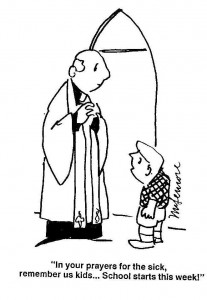Thoughts from Lori +
This past Sunday at Coffee & Conversation, those of us who gathered had a very open and honest discussion about racism. It grew out of the subject of the recent death of Michael Brown in Ferguson, MO. Whatever you think about that tragedy, it seemed clear to us that the blight of racism still plagues us.
What impressed me most about our discussion was the mutual willingness to be honest, to ask open-ended questions – that is, questions without an agenda – and to listen carefully to each other. We talked about white privilege, stereotypes, the media, and our own feelings and experiences. I dare say that each of us came away touched by our sharing. I certainly did.
The subject of racism is, to say the least, a difficult one. One of the concepts often associated with discussions about racism is complicity. The definition of complicity is: the state of being an accomplice; partnership or involvement in wrongdoing. As it relates to racism, the antonym of the word is: detachment. That, I think, is what is relevant here, because it raises the question we must ask ourselves: Am I complicit in racism by way of my detachment? Which naturally leads to other questions: Where does my responsibility lie in this? If this doesn’t have a direct effect on me, do I still have an obligation to do something about it? Why should this matter to me? All of these boil down to the ancient question: Am I my brother’s, my sister’s, keeper? And that leads to the question in the Parable of the Good Samaritan: Who are my brothers and my sisters?
Complicity isn’t easy to embrace. It implies collusion, which I think most of us would deny. No one wants to admit to such a thing, even to ourselves. To even entertain the possibility of complicity suggests that we are, I am, both a perpetrator and a victim; that I have some responsibility beyond my immediate sphere. And here is where many of us get stuck: What am I supposed to do about it?
I’ve never claimed to have the answers. But I am certainly willing to stand with you in the wilderness of the questions. All I hope is that we keep asking them.
Faithfully,
Lori +
“History will have to record that the greatest tragedy of this period of social transition was not the strident clamor of the bad people, but the appalling silence of the good people.” Martin Luther King, Jr.
We’re on Facebook!
Be sure to check us out and “friend” us! “St Paul’s Episcopal Church”
Available for your convenience
For the ease and convenience of those of us who need special assistance, we have a wheelchair and two walkers available for use here at the church. In some cases, that might make attendance easier than unloading your own wheelchair or walker. Feel free to ask for assistance if
you need it. Also, the clergy are most willing to take Communion to you in your seat. Simply let the usher or the celebrant know of your request.
August 31 Servants:
Ushers: Donald Jaworski, Rick Carlstedt Lector: Judy Robel Intercessor: Terry Jaworski Eucharistic Ministers: Deb Lang, Pam Dietmeyer Vestry Persons of the Day: Pam Dietmeyer, Kathy BiggerstaffNew Mother’s Class
The St. Paul Diaper Bank is holding classes for new mothers on Thursdays from 1:00-2:30 p.m. at the McHenry Chamber Office. Classes are free and attendees will receive a package of diapers and the book, What to Expect When You’re Expecting or What to Expect the First Year. Donations for these books, new (approx. $10) or used, will be greatly appreciated. Questions? Please call the church office at 815-385-0390.
Last Day for Official Summer Diaper Drive
Please help us by bringing your diaper donations to church. We will also accept monetary donations. Checks should be made out to “St. Paul’s Diaper Bank.”
June Collection = 619 July = 556 August (as of 8/24) = 679 Total for June, July and August: 1,854Lessons and Hymns Sunday, August 31st (Pentecost XII – Proper 17 A)
by the Rev. William P. McLemore
THE SCRIPTURE LESSONS:
The First Reading: The Track I readings are Exodus 3:1-15 and Psalm 105:1-6,23-26,45c; the Track II readings are Jeremiah 15:15-21 and Psalm 26:1-8. Exodus has Moses tending the sheep of his father when God speaks to him out of the burning bush to free Israel from Egypt. The reading from Jeremiah has the prophet acknowledging his suffering by the people but the Lord affirms he will be protected. The Track I Psalm has God sending Moses and Aaron to free the Jews and the Track II Psalm expresses the joy of righteousness and worship in God’s house.
The Epistle: Romans 12:9-21. Here, St. Paul says, “Let love be genuine” and calls for generosity and the witness to God’s goodness.
The Gospel: Matthew 16:21-28. In this portion of Matthew, Jesus acknowledges that he will be crucified and when Peter protests, he calls for the disciples to “take up their cross and follow me.”
THE HYMNS:
PROCESSIONAL HYMN: No. 7. “Christ Whose Glory Fills the Skies.” This hymn was written by Charles Wesley (1707-1786) which he based on Malachi 4:2. “But for you who revere my name the sun of righteousness shall rise, with healing in its wings.” The tune, “Ratisbon,” is from Johann Werner’s “Gesangbuchern,” (1815). The present harmony is by William Henry Havergal (1793-1870).
THE SEQUENCE HYMN: No. 635. “If Thou But Trust in God to Guide Thee.” This hymn is new to the Episcopal 1982 Hymnal (though almost four centuries old). It was written and composed by Georg Neumark (16 March 1621 – 8 July 1681), a German poet and composer of hymns. In 1640 he began law studies, but fearing the tumult of war, he took a position as tutor instead. This particular hymn was written for himself as much as anyone else as he feared war so much, “God will give thee strength whate’er betide thee, and bear thee through the evil days.”
PRESENTATION HYMN: No. 675. “Take Up Your Cross the Savior Said.” This hymn, new to the 1982 hymnal, was written by Charles William Everest (1814-1877), the first line of each verse is taken from Matthew 16:24, “Then Jesus told his disciples, ‘If any want to become my followers, let them deny themselves and take up their cross and follow me.'” Everest was an ordained Episcopal priest and rector of Grace Church, Hamden, Connecticut, 1842-1873. The tune, “Bourbon,” is attributed to Freeman Lee (1870-1859).
COMMUNION HYMN: No. 439.”What Wondrous Love is This.” This is a beautiful American folk hymn, the words and music of which date back to the early 19th century. It first appears in the “Southern Harmony” of 1835 compiled by William ‘Singin Billy’ Walker, a shape note and tune book. The book contained 335 songs, went through several editions, and became one of the most popular southern tune-books of the century.
RECESSIONAL HYMN: No. 473. “Lift High the Cross, the Love of Christ Proclaim.” The author of this hymn was Dr. George William Kitchin (1827-1912) the first Chancellor of the University of Durham, a learned mathematician, and master historian (see photo). He wrote this hymn in 1887 which holds some symbols from the Book of Revelation (9:4 etc.) “Each newborn servant of the Crucified bears on the brow the seal of him who died.” The tune, “Crucifer,” was composed by Sydney Hugo Nicholson (1875-1947) with the descant by Richard Prouix (1937-2010) organist and composer born in Minneapolis, Minnesota, and died in Chicago.
101 Reasons to be Episcopal
Reason 48
“Being an intelligent, strong woman is not a drawback in the Episcopal Church.”
Cynthia Jo Mahaffey, Diocese of Ohio
From the cartoons created by the Rev. William P. McLemore
1965 – 2014.


